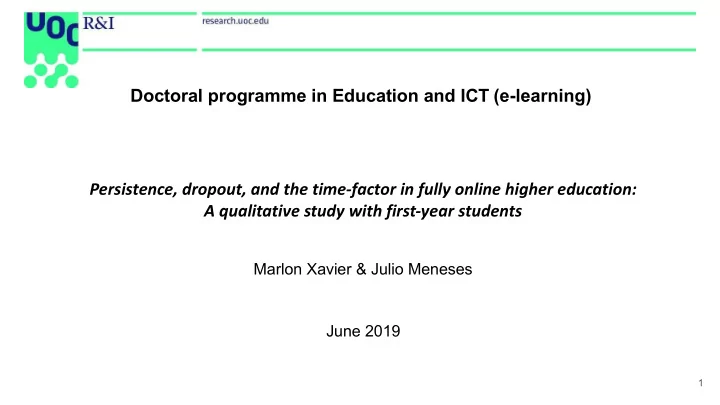

Doctoral programme in Education and ICT (e-learning) Persistence, dropout, and the time-factor in fully online higher education: A qualitative study with first-year students Marlon Xavier & Julio Meneses June 2019 1
What? AIM: exploring how first-year, fully online OHE students experienced and managed their time and how it impacted their persistence, stop-out behavior, or dropout Persistence : to persist with studies (not to stop or dropout) Stop-out : not to re-enroll for one semester Dropout : not to re-enroll for two semesters (to abandon or withdraw) 2
Where? UOC – undergrad programs fully online, open university majority: non-traditional students (adults, job/family) context: ESPRIA (Estudiantes de Primer Año) Project interventions to better students’ first year experience focus on time 3
Why? high dropout rates remain a pressing and complex problem rates at UOC: 57.6% dropout: mainly during first-year, especially first semester (half of 57.6%) due to: time constraints and conflicts, poor time management, procrastination misconceptions about the workload/system (Bawa, 2016) home/family and employment obligations/conflict (Carroll, 2008) 4
Who? 24 first-year, fully online undergraduate UOC students who started their studies at UOC in September 2017 three main profiles: persisters (students who enroll for three consecutive semesters), break (students who leave for one semester but return), and dropouts (students who do not enroll for two consecutive semesters) 5
Who? PERSISTENTE BREAK ABANDONADOR Edad Dedicación Género 1 1 1 Tiempo Hombre parcial 1 1 1 Tradicional Mujer (<25 años) 1 1 1 Tiempo Hombre completo 1 1 1 Mujer 1 1 1 Tiempo Hombre No- parcial 1 1 1 Mujer tradicional 1 1 1 Tiempo Hombre ( ≥ 25 años) completo 1 1 1 Mujer TOTAL 8 8 8 24 6
How? qualitative, exploratory method semi-structured in-depth interviews thematical analysis 7
Preliminary findings each profile experiences time in different manners, and has dissimilar time management skills usually no significant gender differences time-related factors represent the major issue for persistence, continuance, and dropout behavior 8
Preliminary findings Persisters traditional part-time persisters: 30h work week; good time management skills; value UOC system; some time conflict, especially first semester traditional full-time persisters: no work; 30 credits; procrastination problems; succeed; stress at end of semester (conflict) Break Mostly part-time students More women Non-traditional: take breaks mostly because of work conflicts (juggle responsibilities) etc. 9
Thank you 13
Recommend
More recommend